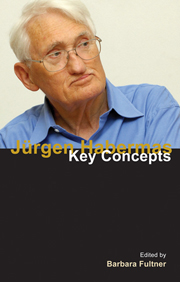Book contents
- Frontmatter
- Contents
- Contributors
- Acknowledgements
- Abbreviations
- Introduction
- 1 Historical and intellectual contexts
- PART I COMMUNICATIVE RATIONALITY
- PART II MORAL AND POLITICAL THEORY
- 6 Discourse ethics
- 7 Deliberative democracy
- 8 Discourse theory of law
- PART III POLITICS AND SOCIAL CHANGE
- Chronology of life and works
- Bibliography
- Index
8 - Discourse theory of law
from PART II - MORAL AND POLITICAL THEORY
- Frontmatter
- Contents
- Contributors
- Acknowledgements
- Abbreviations
- Introduction
- 1 Historical and intellectual contexts
- PART I COMMUNICATIVE RATIONALITY
- PART II MORAL AND POLITICAL THEORY
- 6 Discourse ethics
- 7 Deliberative democracy
- 8 Discourse theory of law
- PART III POLITICS AND SOCIAL CHANGE
- Chronology of life and works
- Bibliography
- Index
Summary
This chapter focuses on Jürgen Habermas's multifaceted, wide-ranging account of law in his 1992 Between Facts and Norms. Habermas's “discourse theory of law” is one of the most capacious and fruitful theoretical paradigms for the study of modern law and legal phenomena available today. This theory, moreover, systematically links up with the other elements of Habermas's philosophy surveyed elsewhere in this volume. Habermas's philosophical method and ambitions are analogous to those of Aristotle and Hegel (although he rejects their metaphysical, ahistorical and essentialist goals). That is, he aims to integrate the partial insights of other theories of law into a systematic account reflecting the complexity of law, while overcoming any partiality, one-sidedness or weaknesses of the other theories. The range of theories considered is very broad, encompassing not only traditional philosophical analyses of law but also perspectives on law from moral philosophy, political philosophy, argumentation theory, philosophy of the social sciences, political science, sociology, international relations theory, comparative constitutionalism, legal dogmatics, theories of legal adjudication and theoretical issues raised by various topics in private law, public law and international law. Thus, any brief survey of Habermas's philosophy of law must be selective and abridge some of the theory's range and complexity. At the risk of over-simplification, this survey of main theses is organized according to three broad perspectives on law: history and sociology; philosophy; and legal adjudication.
- Type
- Chapter
- Information
- Jürgen HabermasKey Concepts, pp. 156 - 174Publisher: Acumen PublishingPrint publication year: 2011
- 2
- Cited by

